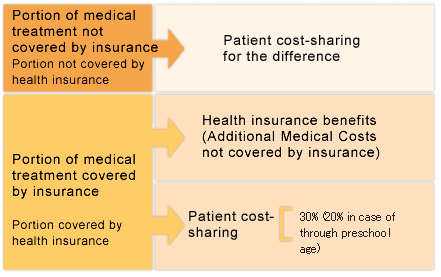 |
When you receive
medical treatment which require patient's pay on the difference  |
 |
 |
 |
| |
 |
|
 When
an insured person undergoes treatment not covered by insurance,
he or she must pay the entire amount of medical costs including
those for treatment covered by insurance. When
an insured person undergoes treatment not covered by insurance,
he or she must pay the entire amount of medical costs including
those for treatment covered by insurance.
However, in response to the advancement of medical technologies and diversifying
patient needs, even when the patient is undergoing treatment not covered
by insurance, health insurance may be used for treatment under evaluation
and elective treatment that meets certain conditions. Although the patient
must pay any amounts exceeding the limits of insurance coverage, insurance
benefits will be provided for medical costs to which insurance applies.
Individual cost-sharing for this portion covered by insurance is 30
percent (20 percent in the event patients are 2 years old or younger)
as it is with general insurance treatment. The remaining amount is
covered by insurance as "Additional Medical Costs not covered by
insurance."
|
 |
|
*
|
Dependents receive benefits for Additional Medical Costs not
covered by insurance as Dependents' Medical Care Expenses.
|
|
*
|
High-cost medical care or additional benefits are available
in cases where cost-sharing by insured persons and dependents
fall within the scope of health insurance.
|
|
*
|
The insured persons and the dependents also cover inpatient
meals (meal and accommodation expenses in the event an elderly
person 70 years old or older is hospitalized in a medical treatments
facility).
|
|
 Treatment under evaluation, Patient-requested care, and elective treatment Treatment under evaluation, Patient-requested care, and elective treatment
|
 |

<Treatment under
evaluation> |
| |
|
This refers to treatment being evaluated for possible insurance coverage in the future, such as new treatment methods and medicines whose medical value has yet to be established. |
| |
|

|
Advanced treatment |

|
Cases involving clinical trials of pharmaceuticals, medical equipment, and regenerative medicine products |

|
Use of pharmaceuticals, medical equipment, and regenerative medicine products approved by the Pharmaceutical Affairs Act prior to application of insurance to such equipment |

|
Use of pharmaceuticals for which drug price standards have been published, for uses other than those covered in such standards
(Those for which application has been made for approval of partial changes to usage, doses, efficacy, or effects) |

|
Use of medical equipment and regenerative medicine products for the purpose outside of insurance coverage
(Those for which application has been made for approval of partial changes to purpose of use, efficacy, effects, etc.) |
| |
|
<Patient-requested care> |
| |
Care such as use of pharmaceuticals not yet approved for use in Japan or use of those approved for use in Japan but for other than their approved uses, subject to accelerated approval as non-insured associated medical care requested by the patient |
| |
|
| |
[Flow from request through care] |
| |
A patient who, following consultation with his or her family doctor or other healthcare provider, would like to use advanced medical care technologies not covered by insurance together with insured medical care, requests such care from the Core Clinical Research Hospital or from a special functioning hospital. After issues like treatment efficacy and safety are explained to the patient, he or she applies to the Japanese government for patient-requested care, attaching a written opinion prepared by the Core Clinical Research Hospital or other facility.
While screening of advanced medical care by the Japanese government traditionally took about six months, in the case of patient-requested care, this time in principle is shortened to six weeks (two weeks in principle for treatment administered in previous cases).
If the application is approved following the screening process, the patient will receive treatment at the Core Clinical Research Hospital or other facility receiving the request. However, depending on the results of the screening, the treatment may be provided at a medical care institution located near where the patient lives. |
| |
|
<Elective treatment> |
| |
This refers to treatment chosen by the patient him or herself that it is assumed not to be covered by insurance, such as special treatment environments. |
| |
|

|
Provision of special treatment environments (hospitalization
in higher-cost beds) |

|
Examination and treatment by reservation |

|
Examination and treatment outside regular hours |

|
Use of higher-priced materials for front teeth |

|
Metallic false teeth |

|
First examination and subsequent examinations at a hospital of 200 or more beds of a patient not referred to that hospital |

|
Treatment conducted more than the designated maximum number of times |

|
Hospitalization for more than 180 days |

|
Continued maintenance after completion of treatment
of childhood cavities |

|
First examination and subsequent examinations of a patient not referred to that hospital or facility at a special functioning hospital or similar facility |

|
Lens reconstruction using multifocal intraocular lens |
 |
|
|
Under the system for the "advanced medical treatment", use of uninsured treatment together with insurance treatment is permitted in special cases. The "advanced medical treatment", assuming certain standards are met in areas such as safety and efficacy, allows you to receive health insurance benefits for the portion of the costs corresponding to ordinary treatment, such as medical consultations. Note that you must still pay the full amount of costs for the advanced medical technology itself. This can reduce the amount you need to pay yourself.
Advanced medical treatment technologies are available only at medical care institutions that satisfy standards established by the Ministry of Health, Labour and Welfare of Japan.
|
|
Health insurance covers charges for hospital rooms. However,
you must pay the balance in the event you occupy a private room
or a "deluxe room" whose cost exceeds the maximum amount
of insurance benefits. Such accommodations are often referred
to as "amenity beds," although they are officially
designated "rooms offering special treatment environments." A
hospitalized patient pays the balance only when he or she has
requested a "room offering a special environment."
Although opinions may vary when it comes to defining what constitutes
a room with good conditions, an extra charge may be sought not only for
a private or twin room, but also for a three- or four-person room if
the following conditions are met.
|

|
1.
|
There are four or fewer beds in a single room
|
|
2.
|
The room floor space is equivalent to 6.4 square meters
or more per person
|
|
3.
|
Facilities are in place affording some degree of privacy
around each bed
|
|
4.
|
Private storage facilities, tables, chairs, and lighting
have been installed
|
 |
|
A large ward transformed into private rooms by erecting veneer
partitioning, a new building, or a sunny building do not constitute
reasons for demanding an extra charge.
|
|
Health insurance covers all types of normal dental treatment.
Insured persons and dependents are required to pay remaining
balances in excess of maximum benefit amounts when they wish
to have a full set of dentures made using a metal base or other
treatments using materials not covered by health insurance.
|
|
 |
|
 |
